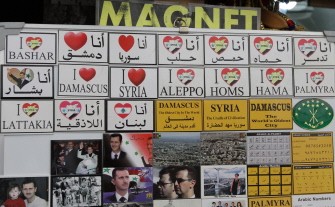DAMASCUS, May 1, 2011 (AFP) - Anti-regime protesters in Syria on Sunday planned the start of a "week of breaking the siege" a day after troops killed six civilians in the southern flashpoint city of Daraa.
The Syrian Revolution 2011, a driving force behind the protests, vowed in a Facebook statement that "we will only kneel before God," and gave a schedule of protests in solidarity with the Daraa and the Damascus suburb of Douma, both besieged since Monday.

Troops in tanks backed by other armoured vehicles cruised Daraa streets on Sunday, shooting to keep residents indoors and arresting men aged 15 and over, an activist from the town told AFP in Nicosia by telephone.
"Since early morning the army and security forces have been combing neighbourhoods one by one and making sweeping arrests. Hundreds have been arrested since Friday," said Abdullah Abizad.
Thousands of troops stormed into Daraa six days ago and imposed a draconian siege on the town, epicentre of seven weeks of protests against the regime of President Bashar al-Assad.
On Saturday, scores of people killed the previous day in a "day of rage" were buried as Assad's regime came under renewed pressure from home and abroad with the United States imposing fresh sanctions on Syria.
At least 66 people were killed on Friday when tens of thousands of people demonstrated across Syria, activists said. The authorities said nine members of the security forces were shot dead by "terrorist groups."
Activists said countrywide protests from Sunday would begin a "week of breaking the siege" -- a reference to Daraa and Douma -- with demonstrations planned for Daraa on Sunday and around Damascus on Monday.
Rallies are planned on Tuesday in the northern towns of Banias and Jableh, Wednesday in Homs, Talbisseh and in Tall Kalakh on the border with Lebanon, and nationwide night vigils on Thursday.
Water and power have been cut in Daraa as the situation worsened after 3,000-5,000 troops supported by tanks stormed the town nearly a week ago.
Abizad said living conditions were worsening.
"The humanitarian situation is very dire. There is no water, no food, no electricity. There are six bodies on the streets since Friday and we cannot get to them because of the snipers. There are also wounded we cannot reach."
"The snipers shoot at everything that moved. We had a dog in our neighbourhood, a white dog, and they even shot him."
On Saturday six more civilians were killed when the army pounded Daraa while snipers on rooftops fired at anyone venturing out, activists said. The son of a Muslim cleric and a pregnant woman were among the dead.
The military said one soldier was killed and seven others wounded in Daraa on Saturday.
At least 582 people have been killed by security forces since the protests erupted, said the Committee of the Martyrs of the 15 March Revolution, which has been keeping a tally of the dead.
More than 66 were reported killed on Friday alone.
Meanwhile, 138 more members of Assad's ruling Baath party resigned in protest at the deadly crackdown on pro-democracy demonstrators, according to collective resignation lists received Saturday by AFP in Nicosia.
Damascus was also the scene of two protests on Saturday.
Around 50 women protested outside parliament, calling for an end to the Daraa and Douma sieges and at least 11 were arrested, a rights activist said.
And nearly 100 people gathered outside the offices of Al-Jazeera television, accusing it of "exaggeration" in its coverage of the Syrian protests.
The National Organisation for Human Rights in Syria also announced the arrest on Saturday of prominent dissident and lawyer Hassan Ismail Abdel Azim, despite the lifting last week of draconian emergency rule.
Meanwhile Washington and the European Union have turned the heat up on Damascus by slapping it with new sanctions.
The United States blocked the assets of Assad's brother Maher, who commands Syria's feared Fourth Armoured Division, and of several other top officials and its intelligence services.
EU ambassadors met on Friday to prepare to impose an embargo on the sale of weapons and equipment that might be used for internal repression and decided to put the brakes on trade deals with Syria.
In Geneva, the UN Human Rights Council endorsed a US call for an investigative mission on the bloodshed as it voted in favour of a resolution condemning the crackdown.
The United Nations Development Programme announced Saturday it was suspending work on a five-year aid programme for Syria because of the increasing unrest.
Meanwhile Turkey braced for an influx of refugees from Syria after allowing 252 to enter as the Turkish Red Crescent sent aid to the border region, official media reported.
























